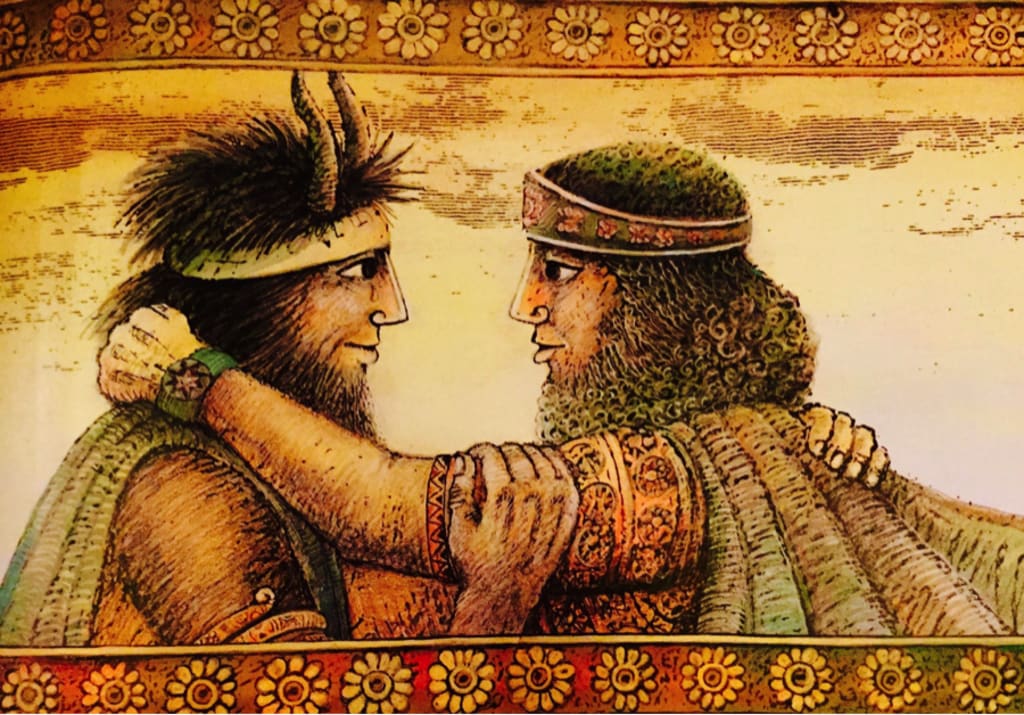
In ancient times, during the reign of the ancient Gods, there existed a powerful Sumerian King named Gilgamesh who ruled over the great city of Euroque in Mesopotamia. Gilgamesh was not an ordinary man, but rather a Demigod, being the son of the priest king, Wanda, and a God. As a result, he possessed extraordinary physical strength and beauty, and had a longer lifespan than normal humans. However, despite his physical qualities, Gilgamesh had an arrogant personality and abused his authority as King, demanding to be idolized by his people and ordering the construction of monuments in his honor. He also seduced any woman who pleased him, regardless of her status or marital status. Over time, the population of the city of Uruk began to repudiate their king and prayed to the Gods to be saved from his cruelty.
In response to their prayers, the Mighty Celestial God felt pity for humans and ordered the goddess of vegetation to create a creature capable of rivaling Gilgamesh. Thus, Enkidu was created from a portion of clay, and was a creature of impressive appearance with bull's horns on his head. Enkidu lived as an animal in the forests and plains of Sumer, eating grass with gazelles and drinking water from the rivers alongside lions. He became the protector of wildlife, but did not know how to approach human beings.
Upon hearing stories about Enkidu's appearance, Gilgamesh sent a priestess from the Temple of Hulk called Saint Rad to investigate the case and try to seduce Enkidu. However, to her surprise, she fell in love with him after seven days and seven nights of love-making. Enkidu learned to wear clothes and eat human food, and Saint Rad told him about Gilgamesh's tyrannical reign.
One day, a big wedding was about to take place in the city of Uruk, and as was customary, Gilgamesh appeared to demand the right to possess the bride before the marriage was consummated. Enkidu, who had become friends with Gilgamesh, challenged him and they engaged in an epic fight that lasted seven days without interruption and destroyed several houses in the city. Each blow delivered between the two Demigods would have been enough to kill five human warriors, but neither of them looked like conceding. Finally, Gilgamesh managed to land a well-aimed blow that knocked Enkidu down, but instead of exterminating him, Gilgamesh extended his hand and helped him up. Both were proud of the great fight they had and greeted each other with a hug, thus sealing a vow of eternal friendship.
After many challenging adventures together, defeating monsters and heroes of all types, Gilgamesh and Enkidu realized that they were getting old and would one day have to face death. Seeking to become immortal, Gilgamesh insisted on traveling to the Forest of Scepters where a powerful demon called Rumbadá lived. Despite the fact that Rumbadá had never strayed from his forest to harm anyone, he still had to defend himself and his attackers. As soon as they saw the demon, the pair of Demigods were paralyzed with terror, but they gathered their courage and attacked. After a fierce battle, they managed to kill the demon, but before dying, Rumbadá cursed them both, saying that one of them would die because of what they did.
The gods turned against Gilgamesh and Enkidu, and the goddess of love, beauty, and war sought revenge by asking her father, the Celestial God Anu, to send the most powerful creature in all creation to kill Gilgamesh. Anu sent the Bull from the Sky to destroy the city of Uruk, and Gilgamesh and Enkidu fought against it. They managed to kill the Bull, but the gods decided that Enkidu must die because he held the Bull of the Heavens by the horns, allowing Gilgamesh to deliver the final blow to the animal.
Gilgamesh's fear of dying impelled him on a journey in search of the secret of immortality. With the help of a boatman called Xanaim, he managed to cross the Great Lake of Poisonous Waters and finally arrived at the Immortal House. However, he was disappointed to learn that only the gods could grant eternal life. He discovered a miraculous plant that could only be found in the depths of the sea and was capable of rejuvenating those who ate it, thus prolonging their lifespan. However, a snake devoured the plant while Gilgamesh was bathing, and he realized that his legacy as a good King would be the closest thing to immortality he could achieve.
In conclusion, the story of Gilgamesh and Enkidu is a tale of friendship, adventure, and the search for immortality.
About the Creator
A História
"Hi. My name is Wellington and I'm a passion for general history. Here, I publish articles on different periods and themes in history, from prehistory to the present day.






Comments
There are no comments for this story
Be the first to respond and start the conversation.